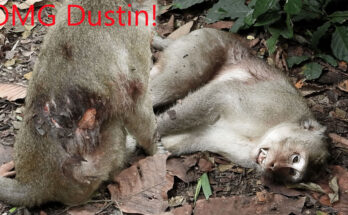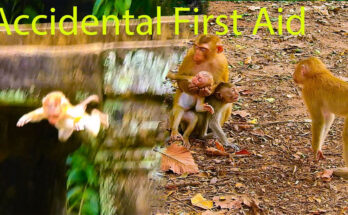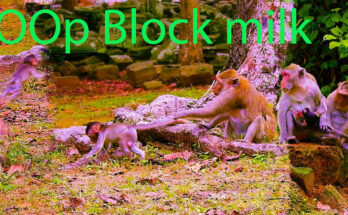Mother Leopard Adopts Baby Baboon After Killing Its Mother
In the heart of the African wilderness, a rare and astonishing event unfolded—one that defied nature’s typical predator-prey relationship. A mother leopard, after taking down a female baboon in a hunt, made an unexpected decision when she discovered the baboon’s tiny, helpless baby clinging to its mother’s lifeless body. Instead of finishing what seemed like an inevitable fate, the leopard did something extraordinary: she gently picked up the baby baboon and carried it to safety, as if adopting it as her own.
A Predator’s Instinct Turns to Compassion
Wildlife photographer and conservationist Adam Reynolds witnessed the event in Botswana’s Okavango Delta. Initially, he had expected a typical scene of survival—nature at its most ruthless. A mother leopard had successfully hunted an adult baboon, a normal part of the food chain. However, as he watched through his camera lens, he noticed something unusual: a tiny baby baboon, no more than a few weeks old, clinging desperately to its mother’s fur.
“The leopard paused when she saw the baby,” Reynolds recalled. “Instead of treating it as another easy kill, she hesitated. Then, to my amazement, she picked it up—not with the brutal force of a predator, but with the gentleness of a mother.”
An Unlikely Bond Forms
With the baby in her jaws, the leopard leaped onto a tree branch, away from scavengers that might have been drawn to the kill. Once settled in a secure spot, she set the baby down and began to nuzzle and groom it. The little baboon, confused but seemingly unharmed, clung to the leopard’s spotted fur as if she were its actual mother.
For hours, the leopard stayed with the baboon, cradling it as she would her own cub. She licked its fur, kept it warm, and even seemed to encourage it to climb onto her back—a behavior typically seen between mother leopards and their young.
Survival Against the Odds
While the heartwarming scene captivated those who witnessed it, the reality of the situation was harsh. A baby baboon needs milk and specialized care that only its own kind can provide. Without proper nourishment, its chances of survival were slim. However, the leopard’s protective instincts seemed to override any thoughts of hunting the defenseless infant.
As night fell, the temperature dropped, and the jungle’s dangers became more pronounced. Hyenas and other predators lurked in the darkness, drawn by the scent of the baboon’s mother. The leopard, sensing the threat, remained on high alert, standing guard over her newfound companion.
Sadly, by morning, the fragile infant had succumbed to the cold and stress of the ordeal. Though the leopard had shown remarkable maternal care, nature had ultimately taken its course. The moment, however, remained extraordinary—a brief but powerful display of compassion from one of nature’s most formidable hunters.
What Does This Mean for Animal Behavior?
Experts who reviewed the footage believe that the leopard’s reaction was driven by a mix of instinct and curiosity. Leopards are known to be highly intelligent and adaptable, and some speculate that this particular mother may have recently lost one of her own cubs. The presence of a small, vulnerable infant—regardless of species—might have triggered her maternal instincts.
“This behavior, while rare, reminds us that animals are more complex than we sometimes assume,” said Dr. Karen Whitmore, a wildlife biologist specializing in big cat behavior. “Predators are not just killing machines; they have emotions, instincts, and sometimes, unexpected moments of empathy.”
A Moment That Touched the World
The story of the mother leopard and the baby baboon spread quickly, touching the hearts of millions. The images captured during the event served as a reminder of the unpredictable and deeply emotional moments that occur in the wild.
Though the baby baboon did not survive, its final hours were not spent alone or in fear. Instead, it was cradled and cared for by the very creature that had taken its mother’s life—a powerful, bittersweet testament to the complexity of nature.


